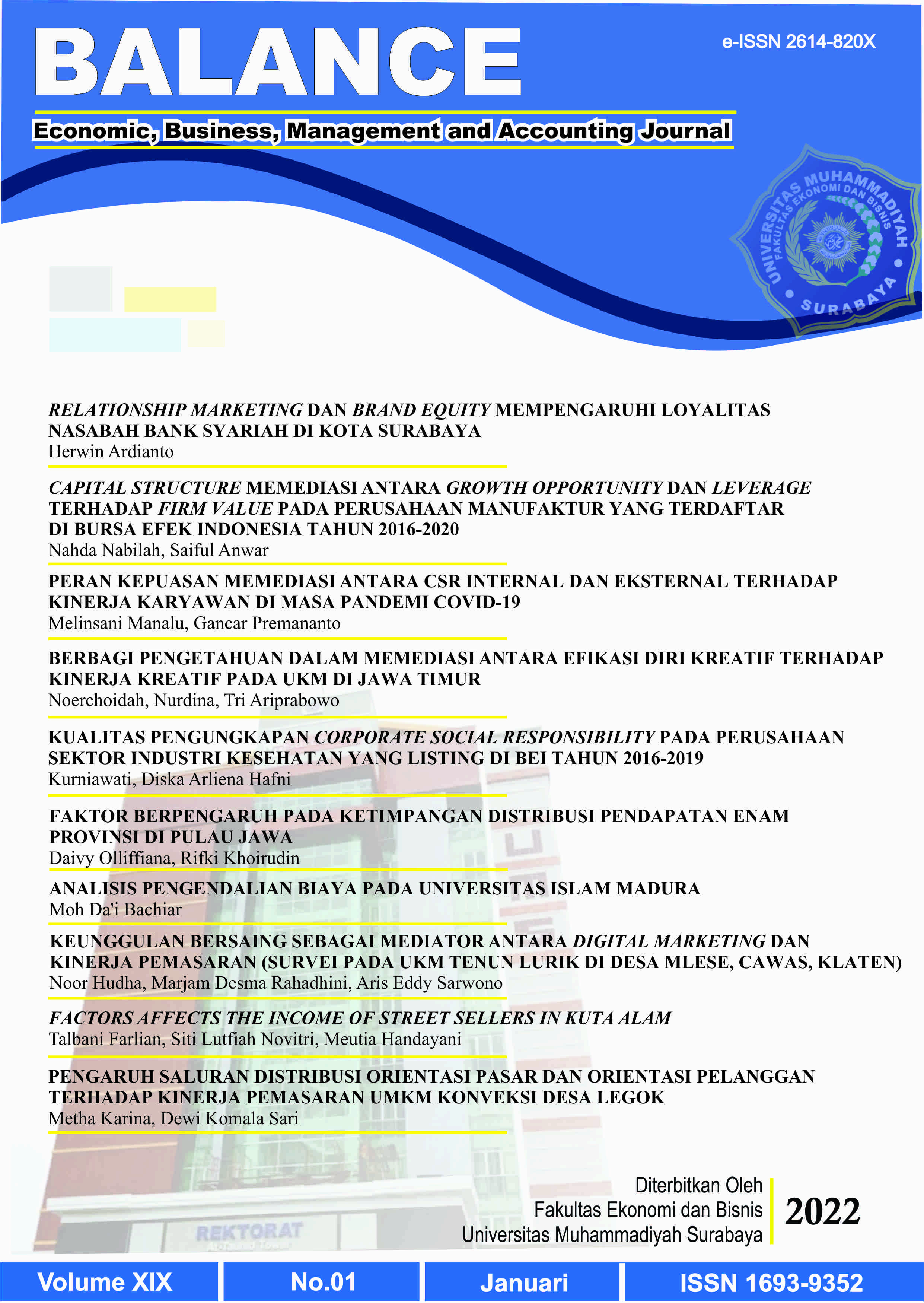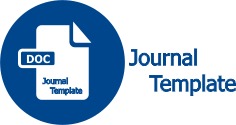Berbagi Pengetahuan Dalam Memediasi Antara Efikasi Diri Kreatif Terhadap Kinerja Kreatif Pada UKM di Jawa Timur
DOI:
https://doi.org/10.30651/blc.v19i1.9952Kata Kunci:
Knowledge sharing, creative self-efficacy, creative performance, berbagi pengetahuan, efikasi diri kreatif, kinerja kreatifAbstrak
ABSTRACT
This study explores the effect of creative self-efficacy and knowledge sharing on the innovative performance of SMEs in East Java. Creative interpretation is very important for SMEs because it is a business sustainability effort. A total of 132 SMEs in East Java as the research sample using the purposive sampling technique. This study uses a quantitative approach with Partial Least Square (PLS) to process the questionnaire results. The results of this study reveal that creative self-efficacy has a significant effect on creative performance. Creative self-efficacy significantly affects knowledge sharing, while knowledge sharing has a significant impact on creative performance. An important finding from this research is knowledge sharing as an intervening of creative self-efficacy on creative performance. The results of this study support the social cognitive theory.
Keywords: Knowledge sharing; creative self-efficacy; creative performance
Correspondence to : noerchoidah@unipasby.ac.id
Â
ABSTRAK
Penelitian ini mengeksplor pengaruh efikasi diri kreatif dan berbagi pengetahuan pada kinerja kreatif UKM di Jawa Timur. Kinerja kreatif sangat penting bagi UKM karena sebagai upaya keberlanjutan bisnis. Sebanyak 132 pelaku UKM di Jawa Timur sebagai sampel penelitian dengan menggunakan  teknik purposive sampling. Penelitian ini menggunakan pendekatan kuantitatif dengan alat Partial Least Square (PLS) untuk mengolah hasil kuesioner. Hasil penelitian ini mengungkapkan bahwa efikasi diri kreatif berpengaruh signifikan terhadap kinerja kreatif. Efikasi diri kreatif berpengaruh signifikan terhadap berbagi pengetahuan, sedangkan berbagi pengetahan berpengaruh signifikan terhadap kinerja kreatif. Temuan penting dari penelitian ini adalah berbagi pengetahuan sebagai intervening efikasi diri kreatif terhadap kinerja kreatif. Hasil penelitian ini mendukung social cognitive theory.
Kata Kunci: berbagi pengetahuan; efikasi diri kreatif; kinerja kreatif
Referensi
Amabile, T. M., & Pillemer, J. (2014). Creativity. Wiley Encyclopedia of Management.
Anderson, N., PotoÄnik, K., & Zhou, J. (2014). Innovation and Creativity in Organizations: A State-of-the-Science Review, Prospective Commentary, and Guiding Framework. Journal of Management, 40(5), 1297–1333. https://doi.org/10.1177/0149206314527128
Bandura, Albert. (2011). A Social Cognitive perspective on Positive Psychology. Revista de Psicologia Social, 26(1), 7–20. https://doi.org/10.1174/021347411794078444
Carmeli, A., Gelbard, R. and Reiter-Palmon, R. (2013). Leadership, creative problem-solving capacity,and creative performance: the importance of knowledge sharing. Human Resource Management, 52(1), 95–121. https://doi.org/10.1002/hrm
Charband, Y., & Jafari Navimipour, N. (2018). Knowledge sharing mechanisms in the education: A systematic review of the state of the art literature and recommendations for future research. Kybernetes, 47(7), 1456–1490. https://doi.org/10.1108/K-06-2017-0227
Chen, G., Whiteman, J. A., Gully, S. M., & Kilcullen, R. N. (2000). Examination of relationships among trait-like individual differences, state-like individual differences, and learning performance. Journal of Applied Psychology, 85(6), 835–847. https://doi.org/10.1037/0021-9010.85.6.835
Chen, M. H., Chang, Y. Y., & Chang, Y. C. (2015). Entrepreneurial Orientation, Social Networks, and Creative Performance: Middle Managers as Corporate Entrepreneurs. Creativity and Innovation Management, 24(3), 493–507. https://doi.org/10.1111/caim.12108
Darvishmotevali, M., Altinay, L., & De Vita, G. (2018). Emotional intelligence and creative performance: Looking through the lens of environmental uncertainty and cultural intelligence. International Journal of Hospitality Management, 73(February 2017), 44–54. https://doi.org/10.1016/j.ijhm.2018.01.014
DiLiello, T. C., Houghton, J. D., & Dawley, D. (2011). Narrowing the creativity gap: The moderating effects of perceived support for creativity. Journal of Psychology: Interdisciplinary and Applied, 145(3), 151–172. https://doi.org/10.1080/00223980.2010.548412
Goh, S. K., Jayaraman, K., Mostafiz, I., & Leow, Y. M. (2020). The effect of organisational climate on employees’ creative performance through knowledge sharing behaviour. Electronic Journal of Knowledge Management, 18(1), 1–14. https://doi.org/10.34190/EJKM.18.01.001
Hair, J. F., Black, W. C., Babin, B. J., & Anderson, R. E. (2010). Multivariate Data Analysis (7th Editio). New York: Prentice Hall International, Inc.
Hirst, G., van Knippenberg, D., Zhou, Q., Zhu, C. J., & Tsai, P. C. F. (2018). Exploitation and Exploration Climates’ Influence on Performance and Creativity: Diminishing Returns as Function of Self-Efficacy. Journal of Management, 44(3), 870–891. https://doi.org/10.1177/0149206315596814
Hsiao, Y. P., Brouns, F., Van Bruggen, J., & Sloep, P. B. (2012). Effects of peer-tutor competences on learner cognitive load and learning performance during knowledge sharing. IADIS International Conference on Cognition and Exploratory Learning in Digital Age, CELDA 2012, October, 265–268.
Hussein, N., Mohamad, A., Noordin, F., & Ishak, N. A. (2014). Learning Organization and its Effect On Organizational Performance and Organizational Innovativeness: A Proposed Framework for Malaysian Public Institutions of Higher Education. Procedia - Social and Behavioral Sciences, 130(May), 299–304. https://doi.org/10.1016/j.sbspro.2014.04.035
Ionica, O. (2013). The Impact of Innovation in Romanian Small and Medium-Sized Enterprises on Economic Growth Development. Journal of Knowledge Management, Economics and Information Technology, 3(6), 1–29.
Jiang, W., & Gu, Q. (2017). Leader creativity expectations motivate employee creativity: a moderated mediation examination. International Journal of Human Resource Management, 28(5), 724–749. https://doi.org/10.1080/09585192.2015.1109535
Jin, N. C. (2004). Individual and contextual predictors of creative performance: The mediating role of psychological processes. Creativity Research Journal, 16(2–3), 187–199. https://doi.org/10.1207/s15326934crj1602&3_4
Johnson, L. D., Neave, E. H., & Pazderka, B. (2002). Knowledge, innovation and share value. International Journal of Management Reviews, 4(2), 101–134. https://doi.org/10.1111/1468-2370.00080
Khalil, N., & Eugene, K. (2011). Individual Factors and Knowledge Sharing Eugene Okyere-Kwakye and Khalil Md Nor Department of Management , University Technology Malaysia ,. Journal of Economics and Business, 3(1), 66–72.
Khalili, A. (2016). Linking Leaders’ Emotional Intelligence Competencies And Employees’ Creative Performance And Innovative Behaviour: Evidence From Different Nations. International Journal of Innovation Management, 20(7). https://doi.org/10.1142/S1363919616500699
Khan, N. A., & Khan, A. N. (2019). What followers are saying about transformational leaders fostering employee innovation via organisational learning, knowledge sharing and social media use in public organisations? Government Information Quarterly, 36(4), 101391. https://doi.org/10.1016/j.giq.2019.07.003
Kimble, C., Grenier, C., & Goglio-Primard, K. (2010). Innovation and knowledge sharing across professional boundaries: Political interplay between boundary objects and brokers. International Journal of Information Management, 30(5), 437–444. https://doi.org/10.1016/j.ijinfomgt.2010.02.002
Kuruppuge, R. H., & Gregar, A. (2017). Knowledge sharing and job performance: the intervening role of technological competency in knowledge-based industries. April.
Liang, C., Hsu, Y., & Chang, C. C. (2013). Intrinsic motivation as a mediator on imaginative capability development. Thinking Skills and Creativity, 8(1), 109–119. https://doi.org/10.1016/j.tsc.2012.09.001
Liu, E. Z. F., Lin, C. H., Jian, P. H., & Liou, P. Y. (2012). The dynamics of motivation and learning strategy in a creativity-supporting learning environment in higher education. Turkish Online Journal of Educational Technology, 11(1), 172–180.
Ma, Z., Long, L., Zhang, Y., Zhang, J., & Lam, C. K. (2017). Why do high-performance human resource practices matter for team creativity? The mediating role of collective efficacy and knowledge sharing. Asia Pacific Journal of Management, 34(3), 565–586. https://doi.org/10.1007/s10490-017-9508-1
Mohammed, S., Syed, A., Alhady, A., Sufi, A., Idris, A., Zakaria, Z., Hilmie, M. Z., Sawal, M., & Azmi, N. A. (2011). Knowledge Sharing Behavior and Individual Factors: A Relationship study in the i-Class Environment. 6, 137–141.
Newman, A., Tse, H. H. M., Schwarz, G., & Nielsen, I. (2018). The effects of employees’ creative self-efficacy on innovative behavior: The role of entrepreneurial leadership. Journal of Business Research, 89(March), 1–9. https://doi.org/10.1016/j.jbusres.2018.04.001
Ng, T. W. H., & Lucianetti, L. (2016). Within-individual increases in innovative behavior and creative, persuasion, and change self-efficacy over time: A social-cognitive theory perspective. Journal of Applied Psychology, 101(1), 14–34. https://doi.org/10.1037/apl0000029
Nurhasanah, N., & Inoprasetya, P. (2021). Kompetensi, Komitmen Organisasi, dan Motivasi terhadap Kinerja Karyawan Verbasar Perum Peruri Karawang. BALANCE: Economic, Business, Management and Accounting Journal, 18(1), 77-83.
Oduntan, K. O. (2014). The Role of Small and Medium Enterprises in Economic Development: The Nigerian Experience. International Conference on Arts, Economics and Management (ICAEM’14) M, 22–23. https://doi.org/10.7336/academicus.2012.05.05
Ren, H., Zhang, Q., & Zheng, Y. (2021). Impact of work values and knowledge sharing on creative performance. Chinese Management Studies, 15(1), 86–98. https://doi.org/10.1108/CMS-08-2019-0287
Saad, G., Cleveland, M., & Ho, L. (2015). Individualism-collectivism and the quantity versus quality dimensions of individual and group creative performance. Journal of Business Research, 68(3), 578–586. https://doi.org/10.1016/j.jbusres.2014.09.004
Sangsuk, P., & Siriparp, T. (2015). Conï¬rmatory factor analysis of a scale measuring creative selfefficacy of undergraduate students.pdf. Procedia – Social and Behavioral, 171, 1340 – 1344.
SCHOEN, J. L. (2015). Effects of implicit achievement motivation, expected evaluations, and domain knowledge on creative performance. Journal of Organizational Behavior, 36, 319–338. https://doi.org/10.1002/job
Setiawan, R., Eliyana, A., Suryani, T., & Wikarsa, V. P. (2020). Shaping creative performance in the disruptive era: Strategic human resources perspective. Systematic Reviews in Pharmacy, 11(12), 1139–1143. https://doi.org/10.31838/srp.2020.12.166
Sharifirad, M. S. (2016). Can incivility impair team’s creative performance through paralyzing employee’s knowledge sharing? A multi-level approach. Leadership and Organization Development Journal, 37(2), 200–225. https://doi.org/10.1108/LODJ-05-2014-0092
Soetjipto, N. (2020). Ketahanan UMKM Jawa Timur melintasi Pandemi Covid-19. Penerbit K media, Yogyakarta.
Taştan, S. B. (2013). The Influences of Participative Organizational Climate and Self-Leadership on Innovative Behavior and the Roles of Job Involvement and Proactive Personality: A Survey in the Context of SMEs in Izmir. Procedia - Social and Behavioral Sciences, 75, 407–419. https://doi.org/10.1016/j.sbspro.2013.04.045
Tierney, P., & Farmer, S. M. (2011). Creative Self-Efficacy Development and Creative Performance Over Time. Journal of Applied Psychology, 96(2), 277–293. https://doi.org/10.1037/a0020952
Tong, C., Tak, W. I. W., & Wong, A. (2013). The Impact of Knowledge Sharing on the Relationship between Organizational Culture and Job Satisfaction: the Perception of Information Communication and Technology (ICT) Practitioners in Hong Kong. International Journal of Human Resource Studies, 3(1), 9. https://doi.org/10.5296/ijhrs.v3i1.3112
Tønnessen, Ø., Dhir, A., & Flåten, B. T. (2021). Digital knowledge sharing and creative performance: Work from home during the COVID-19 pandemic. Technological Forecasting and Social Change, 170(May). https://doi.org/10.1016/j.techfore.2021.120866
Van Acker, F., Vermeulen, M., Kreijns, K., Lutgerink, J., & Van Buuren, H. (2014). The role of knowledge sharing self-efficacy in sharing Open Educational Resources. Computers in Human Behavior, 39, 136–144. https://doi.org/10.1016/j.chb.2014.07.006
Van Den Hooff, B., & De Ridder, J. A. (2004). Knowledge sharing in context: the influence of organizational commitment, communication climate and CMC use on knowledge sharing. Journal of Knowledge Management.
Vancouver, J. B., More, K. M., & Yoder, R. J. (2008). Self-Efficacy and Resource Allocation: Support for a Nonmonotonic, Discontinuous Model. Journal of Applied Psychology, 93(1), 35–47. https://doi.org/10.1037/0021-9010.93.1.35
Wang, S., & Noe, R. A. (2010). Knowledge sharing: A review and directions for future research. Human Resource Management Review, 20(2), 115–131. https://doi.org/10.1016/j.hrmr.2009.10.001
Widyani, A. A. D., Sarmawa, I. W. G., & Dewi, I. G. A. M. (2017). the Roles of Knowledge Sharing in Mediating the Effect of Self-Efficacy and Self-Leadership Toward Innovative Behavior. Jurnal Manajemen Dan Kewirausahaan, 19(2), 112–117. https://doi.org/10.9744/jmk.19.2.112-117
Yeo, G. B., & Neal, A. (2013). Revisiting the Functional Properties of Self-Efficacy: A Dynamic Perspective. Journal of Management, 39(6), 1385–1396. https://doi.org/10.1177/0149206313490027
Zhang, X., & Jiang, J. Y. (2015). With whom shall I share my knowledge? A recipient perspective of knowledge sharing. Journal of Knowledge Management, 19(2), 277–295. https://doi.org/10.1108/JKM-05-2014-0184
Zhou, J., & George, J. M. (2001). When job dissatisfaction leads to creativity: Encouraging the expression of voice. Academy of Management Journal, 44(4), 682–696. https://doi.org/10.2307/3069410
Unduhan
Diterbitkan
Terbitan
Bagian
Lisensi
Hak Cipta
- Hak cipta terhadap artikel yang diterbitkan di BALANCE: Economic, Business, Management, and Accounting Journal adalah penerbit atau BALANCE: Economic, Business, Management, and Accounting Journal.
- Penulis harus menyerahkan hak cipta pada jurnal dengan menandatangai dan mengirimkan form penyerahan hak cipta (template) melalui email balance@um-surabaya.ac.id.
- Penulis dapat menyebarluaskan artikelnya melalui media manapun.
Lisensi
Setiap karya yang ditulis penulis dilisensi dengan Creative Commons Attribution-NonCommercial 4.0 International License.















